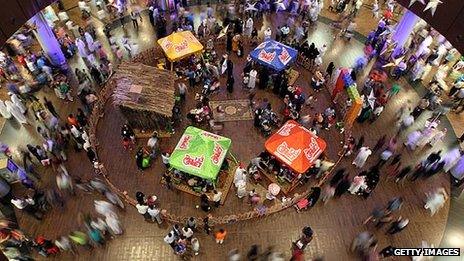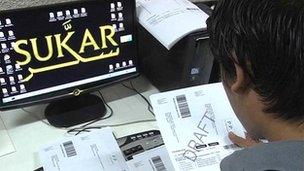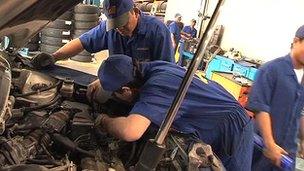Mall v internet: Can ecommerce conquer the Middle East?
- Published

Shopping frenzy: Could online shopping replace the big Gulf malls?
The Middle East isn't renowned for having many big names in the world of online retail.
That may be about to change.
At the moment customers in the region spend around $1.1 billion through the internet. By 2016, it will double to $2.2 billion, according to research by Euromonitor.
That means it is growing at one of the fastest rates in the world.
"Online retailing is still very niche in the Middle East," says Sana Toukan, research manager at Euromonitor International.
"However, it's growing exponentially in places like the UAE and Saudi Arabia."
WATCH: Philip Hampsheir looks at ecommerce in the Middle East
In those countries locals are becoming more comfortable with using credit cards to pay for products over the internet.
Social pressure
It is not only the wealthy parts of the region that are seeing a rise in shopping through the web.
In the last two years, sales in Egypt have surged more than 150%. In Iran they've climbed more than 80%.
"PC ownership in places like Egypt is growing," Miss Toukan says.
"It's mostly fuelled by social networking becoming mainstream among youngsters."
Not everyone agrees with Euromonitor's predictions for the Middle East. Sukar.com operates from two dimly lit warehouses and a glass open-plan office in Dubai's labyrinthine industrial district.
Founded in April 2010, it has rapidly grown across the Arabian Peninsula.
It now serves nine countries. Sukar's Chief Executive, Muhammad Chbib, thinks the market is growing much more quickly than Euromonitor estimates.

Sukar.com is growing between 25 - 30% a month
He says Sukar itself is growing 25 to 30% every month.
"Half a year ago our rate of repeat buyers was around 45%," Mr Chbib says.
"These were our regulars, if you will. Now our rate is closer to 65%."
Group dynamics
He may have a point.
Euromonitor's numbers only include physical goods sold through the internet - items like books, DVDs and clothes. That means they do not include things like banking, booking holidays or the rapid growth of so-called "group buying" websites.
These companies bundle together services - from restaurant meals to spa visits - and send vouchers out by email. Customers then redeem the vouchers in a physical store to get their service.
Less than a hundred metres away from Sukar's head office, is a car mechanics called Fast Track. It is nestled behind a local petrol station.

Fast Track mechanics saw a sharp increase in business selling online
Cars are queuing up to have their oil pressure checked and their tyres changed. It is noisy and busy.
They have seen a sharp increase in business after using a local commerce company called Living Social to sell over the internet.
They bundled several maintenance services together and sold them at a discounted price to see if they could get new customers in through the door.
Ahmad Ayyash is the company's general manager. He thinks selling online will be a competitive advantage for his garage over rivals.
"We really don't want to be left behind," Mr Ayyash says. "Online sales and e-commerce is definitely gaining momentum in this marketplace. We believe this is the way to go in the future."
He is not alone in this view.
Arti Bhatia runs an upscale men's beauty salon called "The Signature Lounge".
"Our website was the first thing we worked on," Mrs Bhatia says. "The world is moving fast. The internet is the only way people are actually looking for options."

Hairdressers are looking to maximise their web presence
Like Fast Track, The Signature Lounge has also used "group-buying" websites to help boost sales.
It allows smaller retailers to sell online without investing heavily in the software needed to take secure credit and debit card payments.
"Services are doing very well in places like the Gulf," says Mrs Toukan.
"We don't include group-buying web sites in our numbers because they sell a lot of services."
It is difficult to include things like haircuts and car maintenance in figures for internet sales.
The problem is knowing where to draw the line. Both Fast Track and The Signature Lounge say they're looking for ways to increase sales through the web.
Both say also they'll use the online group buying companies to sell vouchers for their businesses again.
Fast Track was so taken aback by its success it is even considering taking payments online through its own website.
However, for the time being, Mr Ayyash says he prefers to take the cash from customers when they physically walk through the door.
"The nature of our service is that customers have to bring their car in here," says Mr Ayyash.
"There will always a contact point here when the customer comes in."
It does not count as an online sale when it is fully researched and booked through the internet but the cash actually changes hands in the real world.
Likewise, for the time being, any increasing revenue seen by using group buying or local commerce websites is also excluded - even when the payment is actually made through the Internet.
It all means that expecting online retailing in the Middle East to double, could actually be wildly low of the mark.